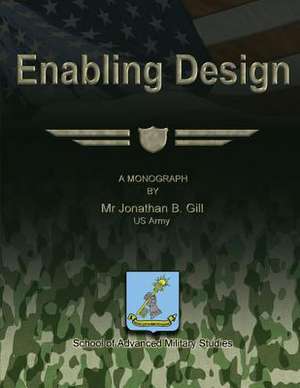Enabling Design
Autor Us Army Jonathan B. Gill Contribuţii de School Of Advanced Military Studiesen Limba Engleză Paperback
Preț: 117.39 lei
Nou
Puncte Express: 176
Preț estimativ în valută:
22.46€ • 24.02$ • 18.73£
22.46€ • 24.02$ • 18.73£
Carte disponibilă
Livrare economică 27 martie-10 aprilie
Preluare comenzi: 021 569.72.76
Specificații
ISBN-13: 9781479196326
ISBN-10: 1479196320
Pagini: 92
Dimensiuni: 216 x 279 x 5 mm
Greutate: 0.24 kg
Editura: CreateSpace Independent Publishing Platform
ISBN-10: 1479196320
Pagini: 92
Dimensiuni: 216 x 279 x 5 mm
Greutate: 0.24 kg
Editura: CreateSpace Independent Publishing Platform
